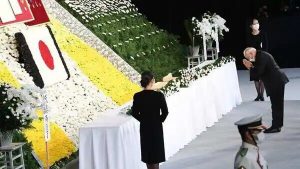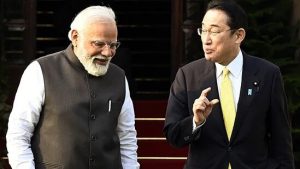By Simran Walia

Prime Minister Narendra Modi recently visited Tokyo to attend the state funeral of former Japanese Prime Minister Shinzo Abe, who was assassinated in July. Many other leaders from around the world also attended the event, including US Vice President Kamala Harris, Australian Prime Minister Anthony Albanese and Singapore’s PM Lee Hsien Loong among others. In his message, PM Modi appreciated Shinzo Abe’s legacy as he also shared a personal rapport with the leader which further gave a major boost to India-Japan relations. Ahead of the funeral, Mr Modi and Japan’s Prime Minister Fumio Kishida held bilateral talks and exchanged views on further deepening India-Japan cooperation in all spheres.
PM Modi highlighted Abe’s contributions in strengthening the India-Japan partnership and his enduring commitment in conceptualising the vision of a free and open Indo-Pacific region. Abe dedicated his life to making Japan a better place domestically and internationally too. He played a pivotal role in elevating India-Japan ties to that of a special strategic and global partnership. Abe was the longest serving Prime Minister of Japan as he served two terms: 2006-2007 and then 2012-2020. He resigned in August 2020 due to health reasons. Abe was the first Japanese PM to be a Chief Guest at India’s Republic Day parade in 2014 which showed India’s commitment towards Japan.
When Abe visited India for the first time in 2007, he laid the foundation for the concept of the Indo-Pacific through his speech on, ‘Confluence of the Two Seas’. In the years since his famous speech, the concept of the Indo-Pacific has become mainstream and one of the most vital pillars of boosting India-Japan ties. The special strategic and global partnership between the two nations encompassed areas such as civil nuclear energy, economic relations such as bullet trains to quality infrastructure, maritime security and India’s Act-East policy to Indo-Pacific strategy. Under Abe’s tenure, the two nations decided on holding 2+2 foreign and defence ministers’ meetings and also started negotiations on the Acquisition and Cross-servicing agreement, which is a military logistics pact. The agreement was finally signed in September 2020. India also decided to introduce the Shinkansen system (bullet train) during Abe’s visit to India in 2015. India and Japan formed an Act East Forum wherein, Japan was engaged in projects in India’s Northeast region.

India admires and respects Abe to a point that the Indian government announced Padma Vibhushan award for Abe in January 2021, India’s second-highest civilian award. PM Modi’s last meeting with Abe was in May this year during the sidelines of the Quad summit in Tokyo. Modi and Abe had developed a personal bond which helped in elevating relations between the two nations and Modi also highlighted this in his meeting with Kishida. In the meeting, Modi said, ‘India and Japan’s friendship has played a huge role in creating a global impact’. He also expressed his hope in deepening relations between the two nations under Kishida’s administration. Japan is one of the trusted and strategic partners for India and the two leaders expressed their commitment to strengthen their bilateral partnership in areas of trade and investment, defence cooperation, infrastructure, digital space, industrial development and human resources among others. Moreover, both nations share deep collaboration and convergence in the vision of the Indo-Pacific region.
This bilateral meeting provided another opportunity to the two leaders to reaffirm their commitment to deepening multi-faceted partnership between India and Japan. The legacy of former PM Shinzo Abe and the commitment of PM Modi and PM Kishida will continue to guide the India-Japan partnership to new heights.
Author Profile
- India Writes Network (www.indiawrites.org) is an emerging think tank and a media-publishing company focused on international affairs & the India Story. Centre for Global India Insights is the research arm of India Writes Network. To subscribe to India and the World, write to editor@indiawrites.org. A venture of TGII Media Private Limited, a leading media, publishing and consultancy company, IWN has carved a niche for balanced and exhaustive reporting and analysis of international affairs. Eminent personalities, politicians, diplomats, authors, strategy gurus and news-makers have contributed to India Writes Network, as also “India and the World,” a magazine focused on global affairs.
Latest entries
 DiplomacyJanuary 5, 2026India walks diplomatic tightrope over US operation in Venezuela
DiplomacyJanuary 5, 2026India walks diplomatic tightrope over US operation in Venezuela India and the WorldNovember 26, 2025G20@20: Africa’s Moment – The Once and Future World Order
India and the WorldNovember 26, 2025G20@20: Africa’s Moment – The Once and Future World Order DiplomacyOctober 4, 2025UNGA Resolution 2758 Must Not Be Distorted, One-China Principle Brooks No Challenge
DiplomacyOctober 4, 2025UNGA Resolution 2758 Must Not Be Distorted, One-China Principle Brooks No Challenge India and the WorldJuly 26, 2025MPs, diplomats laud Operation Sindoor, call for national unity to combat Pakistan-sponsored terror
India and the WorldJuly 26, 2025MPs, diplomats laud Operation Sindoor, call for national unity to combat Pakistan-sponsored terror







